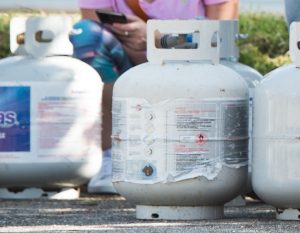Proposed Chinese tariffs on propane may boost US PP – Braskem
Al Greenwood
10-May-2018
HOUSTON (ICIS)–China’s proposal to impose retaliatory tariffs on US exports of propane could increase US margins of polypropylene (PP), the head of Braskem said on Thursday.
 Photo by Orit
Ben-Ezzer/ZUMA Wire/REX/Shutterstock
Photo by Orit
Ben-Ezzer/ZUMA Wire/REX/Shutterstock
China had proposed the tariffs on propane, linear-low-density polyethylene (LLDPE) and low-density PE (LDPE) among other US exports in response to that nation’s bid to impose tariffs on exports from China.
Missing from China’s proposed tariff list is PP.
If China does impose tariffs on propane, then that could create a glut in the US.
The US is already the world’s largest exporter of liquefied petroleum gas (LPG), and much of that goes to China.
If China imposes tariffs on US propane, then more of this material could remain in the US.
Higher supplies of propane could lower prices and improve margins for propane dehydrogenation (PDH) units in the US. These plants convert propane into propylene, the main feedstock for PP.
Lower propane prices would also make the material more attractive as a feedstock for crackers in the US. Many US crackers can use ethane or propane as a feedstock.
If these crackers favour propane, then that would increase production of propylene. Heavier cracker feedstocks produce higher yields of heavier monomers like propylene.
Lower production costs for propylene should translate into higher margins for PP.
Braskem has PP plants in the US and it is building a new one in La Porte, Texas.
“Our own plant that is being built will probably be very competitive to export,” said Fernando Musa, CEO. He made his comments during an earnings conference call. Exporting PP from the US could once again become a good business.
Other companies that have announced PP plants in the US may accelerate their projects, he said. Companies considering plants may make final investment decisions (FIDs) sooner.
China relies on propane imports from the Middle East and the US for its PDH plants, and Musa said the country could not rely solely on the Middle East for feedstock. The tariffs would thus increase prices for PP.
Global News + ICIS Chemical Business (ICB)
See the full picture, with unlimited access to ICIS chemicals news across all markets and regions, plus ICB, the industry-leading magazine for the chemicals industry.
Contact us
Partnering with ICIS unlocks a vision of a future you can trust and achieve. We leverage our unrivalled network of industry experts to deliver a comprehensive market view based on independent and reliable data, insight and analytics.
Contact us to learn how we can support you as you transact today and plan for tomorrow.
READ MORE

